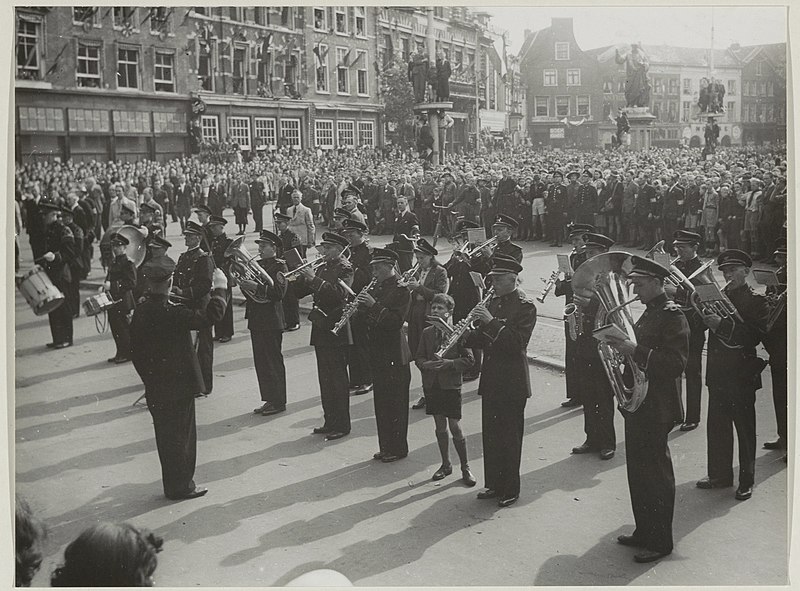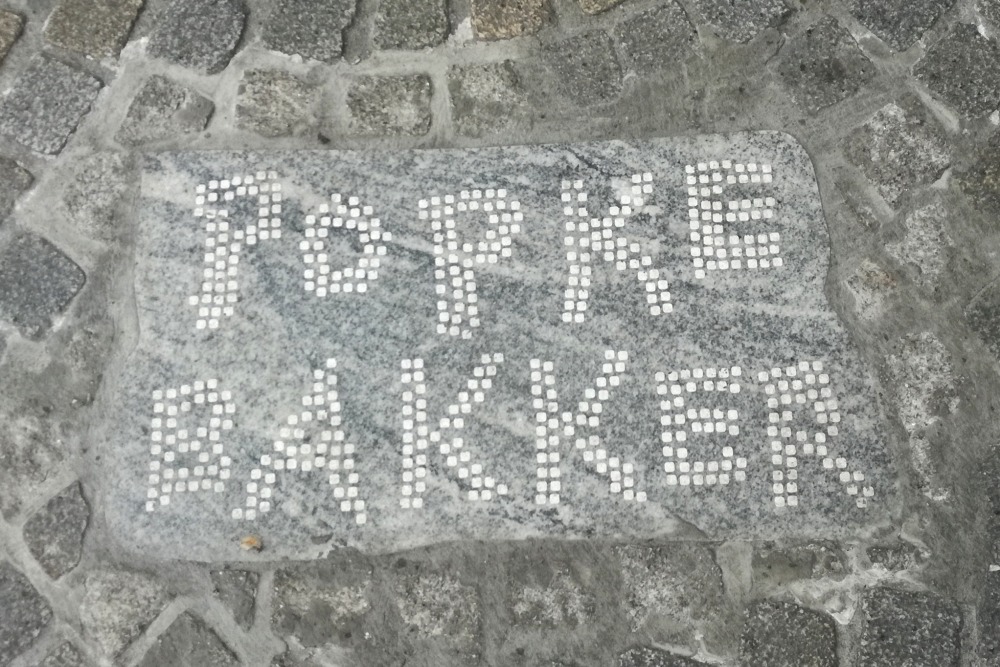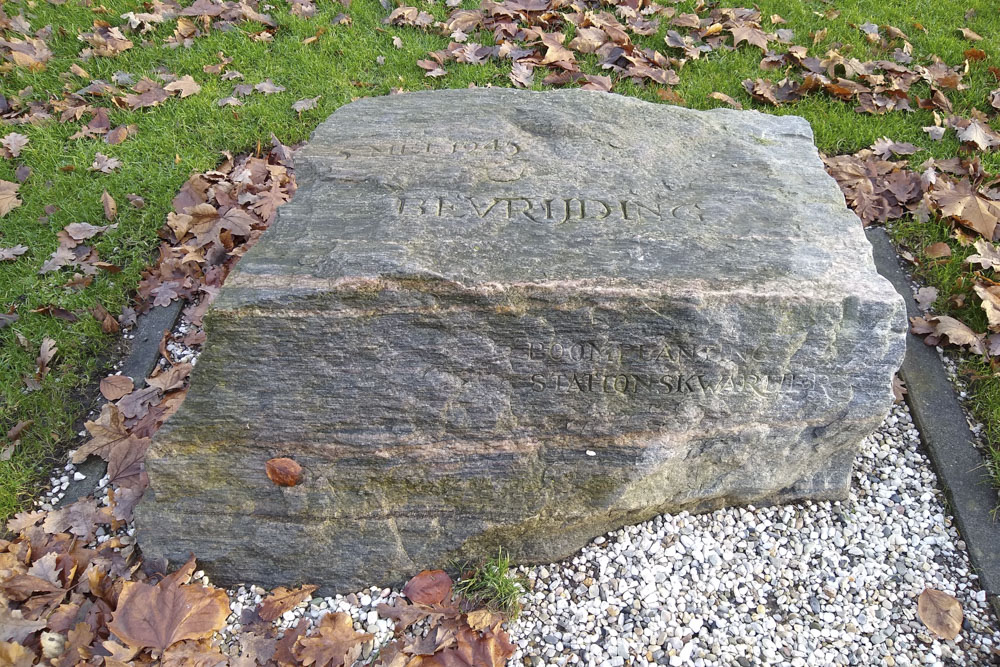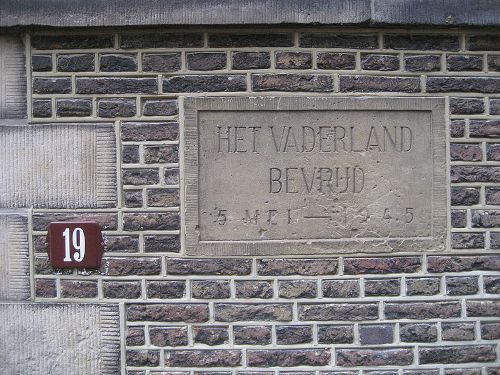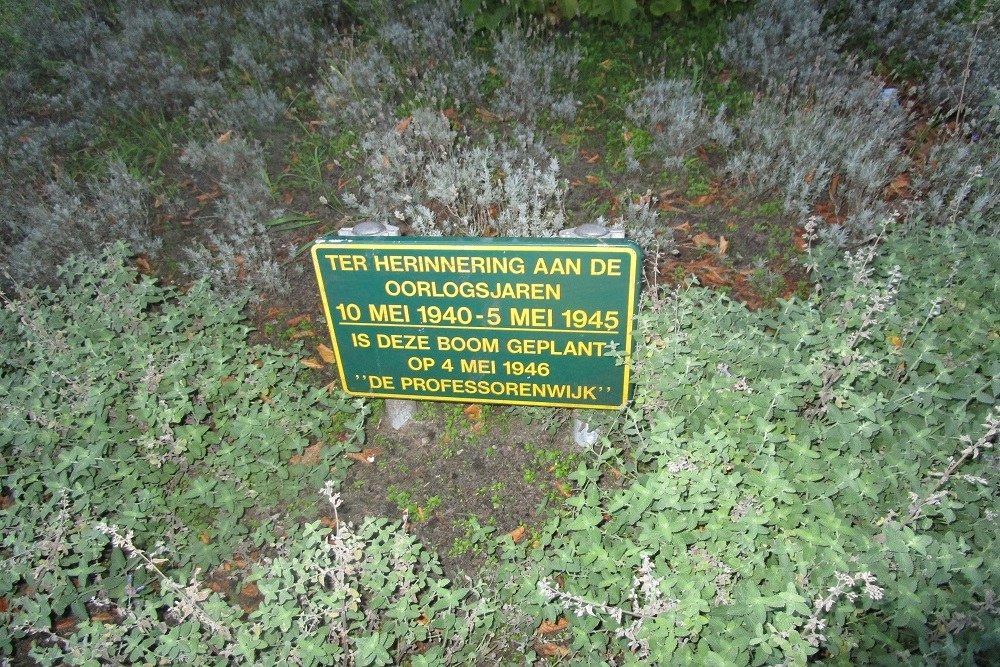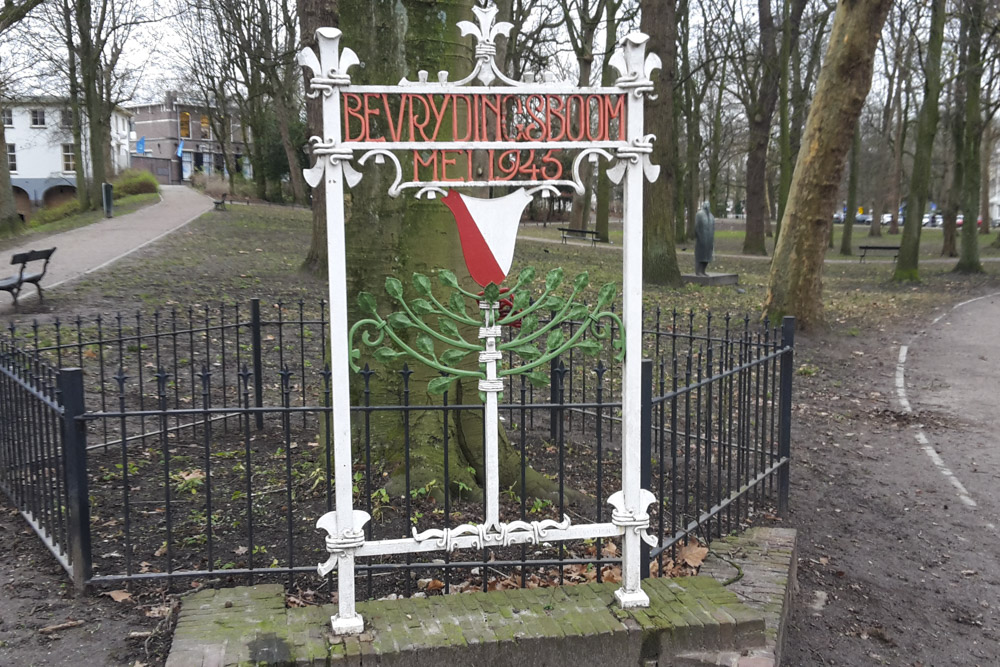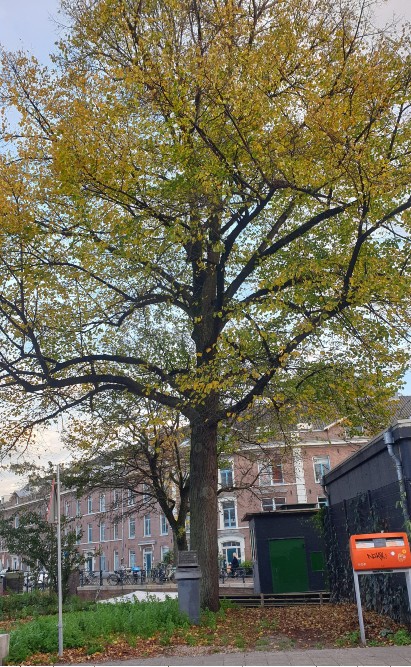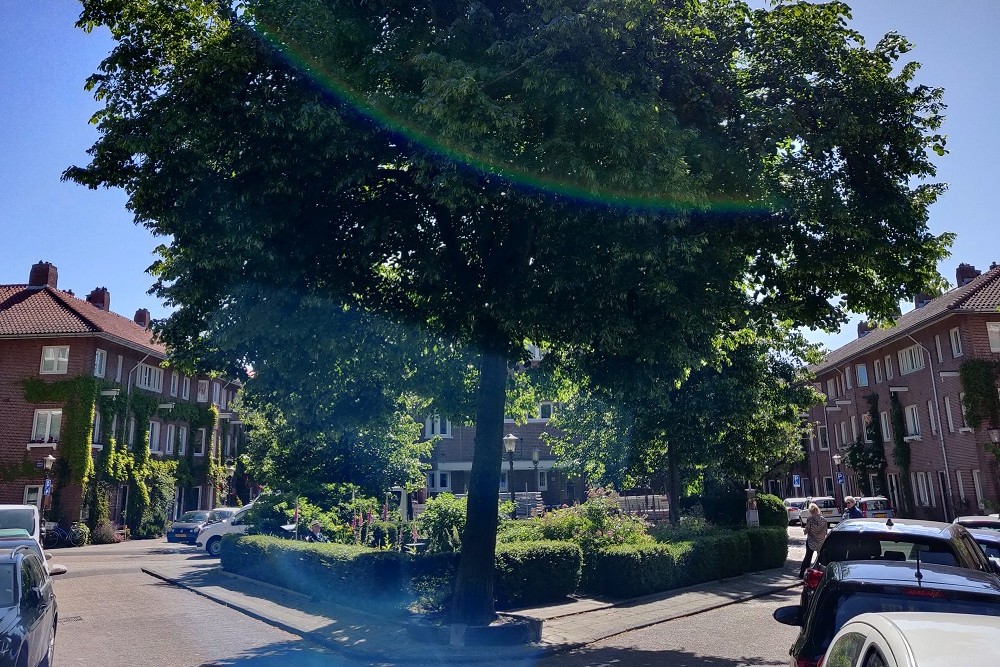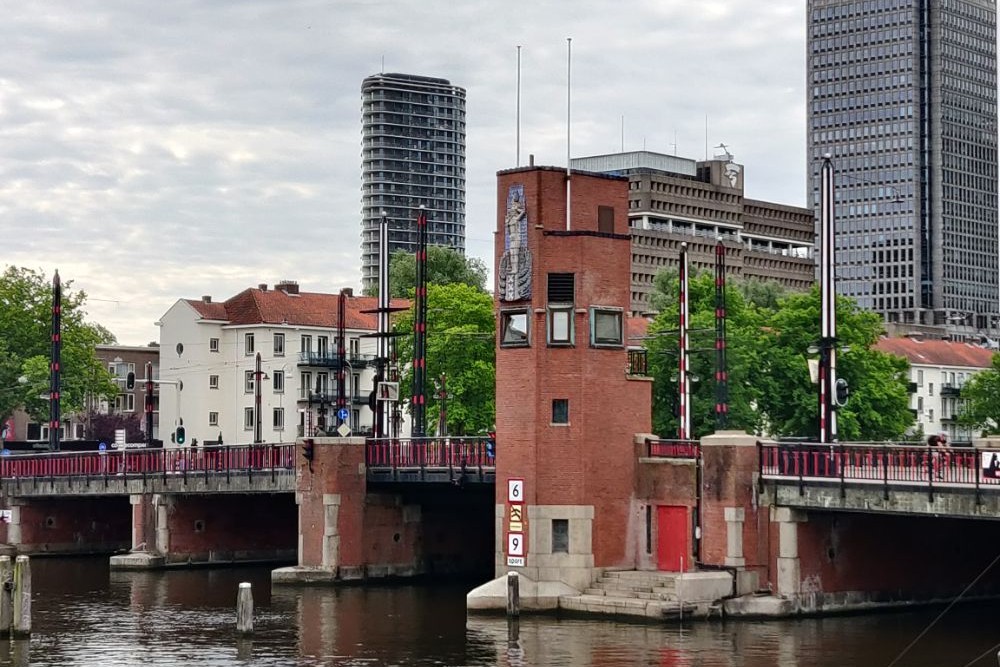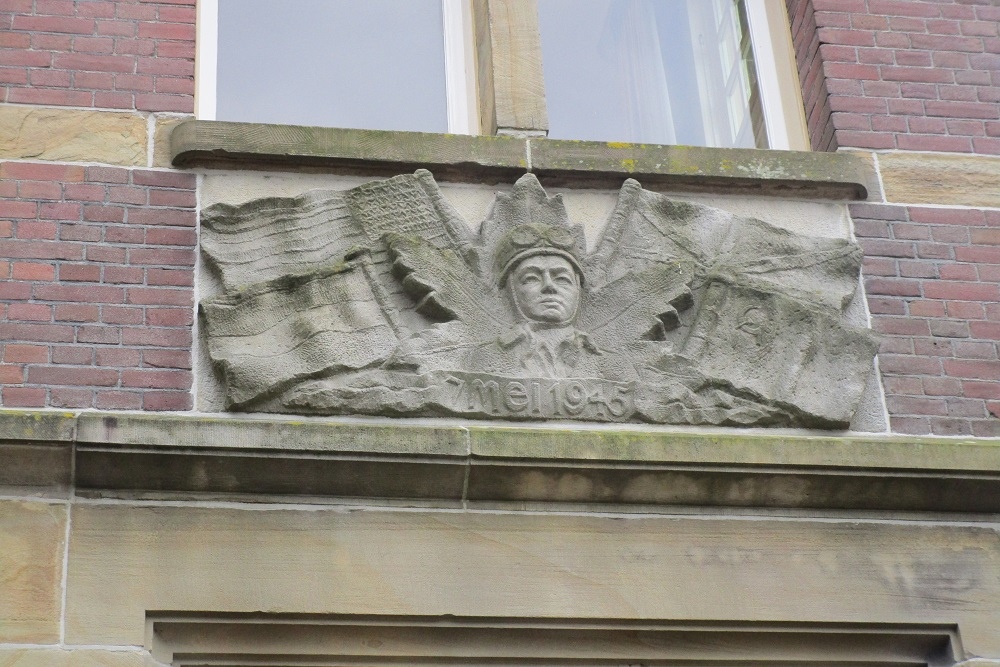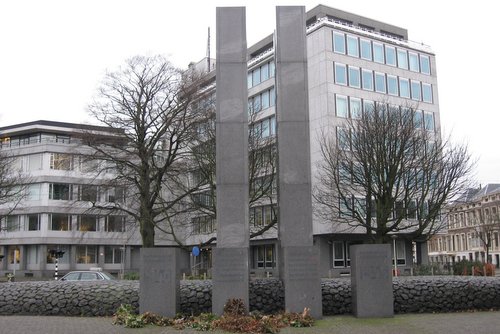Prologue
On May 4, around 21:00 Radio Oranje sent a message that the German troops in the Netherlands would capitulate the next morning. Half of the diary writers already began throwing parties in the evening of May 4. In general this caused great disillusion.
'Vanavond om half 10 hoorden we, dat de moffen gecapituleerd hebben in Nederland Denemarken en West-Duitsland. Morgen om 8 uur gaat de capitulatie in! Dus morgen zijn we bevrijd!! Hiep hiep hoeraaaa!!! Om half 10 gingen alle mensen de straat op, naar de Grote Markt. Net toen wij ook wilde gaan kwam de Duitsche politie en begon te schieten. Toen zijn we maar niet meer gegaan.' (This evening at 21:30 we heard that the Krauts (curse name for Germans) have capitulated in the Netherlands, Denmark and Western Germany. Capitulation is definite as from 08:00. So, tomorrow we are liberated!!! Hooray, hooray, hooray!!! At 21:30, all people took to the street towards the Grote Markt. Just when we wanted to go as well, the German police arrived and opened fire. We didn't go after all.')[1] The J.M.G. Beelen family, the school girl from Haarlem, managed to stay inside before the police intervened. Rudolf Jacob Lodewijk Simons, the Jewish male with a forged ID card was present however when the police intervened.
'Vandaag om 9 uur werd door de radio bekend dat de Duitsche troepen in Denemarken, Holland en N.W. Duitschland gecapituleerd hebben. Om kwart over negen stroomden reeds van alle kanten menschen de straat op. Vlaggen werden uitgestoken en werden vreugdevuurtjes gestookt en binnen een half uur was er in de straat een volledige feeststemming. (…) Maar weldra verschenen er Landwachters tusschen de menigte en werd er geschoten en ook de Grüne verdreef het publiek van de straat. Het zit hier tenslotte nog vol gewapende moffen. Om half elf was alles in de stad weer stil.' (Today at 21:00 we heard on the radio that that German troops in Denmark, the Netherlands and northwestern Germany have capitulated. At 21:15, people took to the streets from all sides. Flags were hoisted, bonfires were lit and within half an hour, a festive mood prevailed in the street. (…) Soon however, the Landwacht appeared among the people, shots were fired and the Grüne also drove the people from the street. After all, it is still crowded with armed Krauts here. At 22:30, all was quiet in town again.')[2]
The real feeling of being liberated was felt by 28 diary writers in the evening of May 4 when they go out on the street after having heard the message on Radio Oranje. As appears from previous quotes, this night was a great disillusion for some of the diary writers. Festivities were disrupted by German troops and Landwachters threatened to open fire. The fact that next morning, festivities could go on again was a consolation for the 28 diary writers who were chased back into their homes on May 4. Others were already asleep, didn't dare to go out or didn't record this date in their diary. In the days that followed, some sentiments arose of how diary writers experienced the liberation. These will be discussed in this article.
Definitielijst
- Capitulation
- Agreement between fighting parties concerning the surrender of a country or an army.
- Landwacht
- Armed NSB-members with police authority.
Liberation: one big party.
The first feeling during the liberation was one of festivities and joy without any unpleasantness or criticism. The majority of the diary writers saw the liberation as one big party and didn't judge the liberation itself. In the early morning of May 5, the festivities began in which they participated. Jan Bok, a 35-year old employee of the Rijksgebouwendienst, (the company that owns and maintains the government buildings) in The Hague and member of the resistance group Vakgroep J wrote:
'Een zonovergoten straat en mensen met oranje getooid. Een zee van vlaggen, een parade van de meest uiteenlopende uniformen van lang ondergedoken organisaties; de padvinders, spoorwegpersoneel, Leger des Heils, militaire uniformen, allemaal verschijningen die we lange jaren niet gezien hadden. Dat was de Vrijheid, dat was de bevrijding.' (A sun-drenched street and people wearing orange. A sea of flags, a parade of a wide variety of uniforms of unions that had been in hiding a long time: scouts, railway workers, Salvation Army, military uniforms; all sorts of things we hadn't seen for years. That was Freedom, that was liberation).
At that moment, he was transporting a Jewish family, a promise he wanted to keep, despite the festivities:
Plotseling ging er een schrik door het publiek: een colonne Grüne Polizei op de fiets naderde, de karabijnen over de schouder, in hun berekende indrukwekkende houding op de fiets. Driegend loerden de ogen onder de randen van de helmen, zwijgend reed de troep verder. Op de stoep stond een juffrouw met een groot boeket goudsbloemen die ze hoog optilde in de richting van de moffen. ‘Moordenaars’ klonk het duidelijk over de straat, ‘rotmoffen', dat is nu onze kleur!!!’ De Grüne reed zwijgend verder.' (Suddenly people got scared: a group of Grüne Polizei approached on bikes, their carbines at the shoulder with their characteristic impressive attitude. Threatening eyes below the rims of their helmets, they rode on in silence. A lady stood on the sidewalk with a large bouquet of marigolds, lifting them high in the direction of the Krauts. The cry "Murderers" sounded clearly across the street "you rotten Krauts, this is our color now!!! The Grüne rode on in silence).[3] Interesting in this quote is the presence of the German Grüne Polizei. Whereas the night before, the Dutch were being chased back into their houses, on May 5 it was quite the opposite. Festivities could now continue undisturbed.
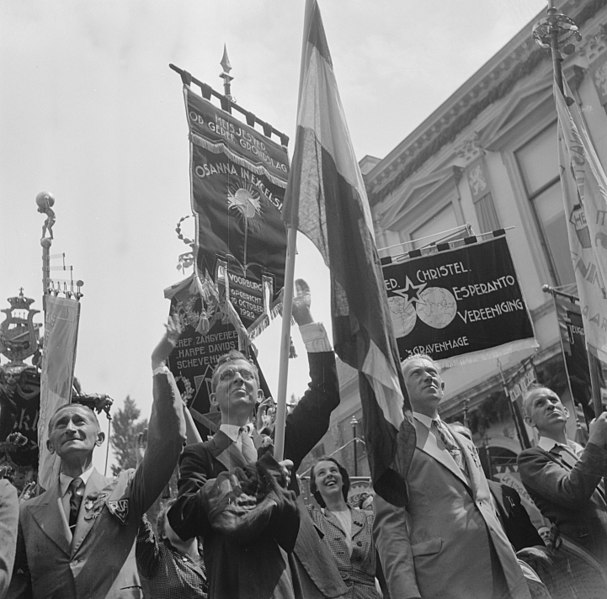
Representatives of all sorts of pre-war unions dare to go out on the streets again with uniforms and banners. Source: Wikipedia/Nationaal Archief.
Han de Wilde, the shopkeeper from Breestraat also rose early to celebrate.
'Er mocht gevlagd worden en ik was derhalve de eerste op de Breestraat, die de vlaggen uit had. Weldra was de heele stad een vlaggenzee, kwamen opeens overal de speciale oranje etalages te voorschijn… werden er proclamaties en strooibiljetten uitgedeeld enz. Iedereen droeg opeens oranje en men zag de Binnenlandse Strijdkrachten voor het eerst openlijk en in uniform optreden. (Flags were allowed and so I was the first on Breestraat to hoist the flag. Soon, the entire city was one huge sea of flags, suddenly special orange shop windows appeared all over town …..proclamations and flyers etc. were being distributed. Everybody suddenly wore orange and we saw members of the BS acting openly and in uniform for the first time).[4]
Almost all diary writers, 58 in total, described the abundance of Dutch, English and American flags, the excess of orange in clothing and shop windows, the pre-war uniforms and the festivities in the streets. 32 diary writers could be found on the streets, enjoying the music and the festivities. They were care free in these days and described how they joined each party, met at central locations in town to hear speeches from the former mayors and waited for the arrival of the Allies.
During the liberation, traitors to the country were treated harshly. Diary writers with this feeling either didn't agree with these penalties in public or didn't participate. One of the most extensive and meticulous descriptions of the treatment of Kraut girls stems from the diary of 35-year-old housewife A.M. van den Elsen from Zoetermeer. During a bike ride to the center of The Hague she observed the following:
'Tussen de joelende menigte kwam een dichte zwarte auto van een of andere firma aangereden. Enige jonge kerels zaten er bovenop. Vlak erachter reed een grote boerenkar met enige zingende meisjes. Eerst wisten we niet wat het betekende todat.er een meisje naar ons toe kwam: 'paters, we gaan een paar meiden, die met D liepen, kaalscheren'. Het volk joelde en juichte. Plots werd het even doodstil. De deur van een auto werd opengemaakt en de twee meiden werden eruit getrokken en op de boerenkar gezet, waar de meisjes intussen afgesprongen waren. Toen begon het vonnis. Enige kerels hielden de meiden goed vast, terwijl een paar andere met grote scharen de krullen afknipten en tussen de joelende menigte gooiden. Een andere voltooide het werk door ze met een haarmachine kaal te knippen. Alleen in het midden lieten ze een klein plukje staan waar ze een oranje strikje aan bonden. Wat hadden de mensen een plezier. Daarna ging het op de boerenkar het dorp door, terwijl het volk er achteraan hoste. Even later kwam er een lange rij meisjes en Canadezen gearmd aangehost.(Surrounded by a booing crowd, a closed black car from some firm drove up, some young men sitting on top of it. Right behind it was a large farm cart carrying some singing girls. At first we didn't know what it meant until a girl came up to us: "we are going to shave a few girls who made friends with Germans." The people booed and yelled. Suddenly it became deathly silent for a while. The door of the car was opened and two girls were drawn out and placed on the farm cart from which the other girls had come down meanwhile. Then the sentence was executed. Some guys held the girls tightly while others cut off their locks with big scissors and threw them into the yelling crowd. Another guy completed the work by shaving them almost completely bald with hair clippers. In the middle, they left only a small strand to which a small orange bow was tied. The people enjoyed themselves enormously. Next the girls were paraded through the village on the farm cart followed by the yelling people. A little later, a long line of Canadians, walking arm in arm with girls, came by, jigging and singing).[5]
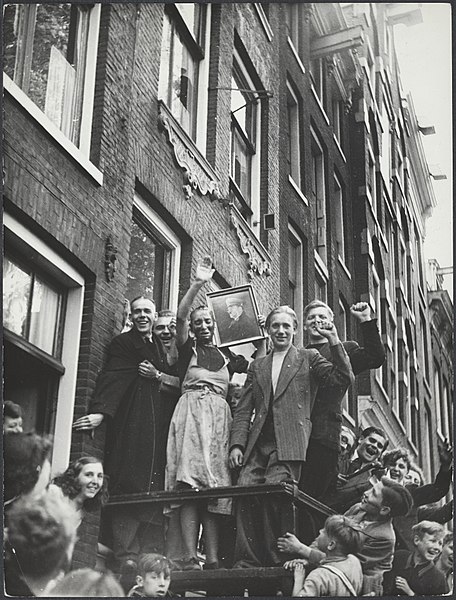
A shorn woman, suspected of collaboration, is publicly forced to salute Hitler's portrait. Source: Wikipedia/Fotocollectie Anefo
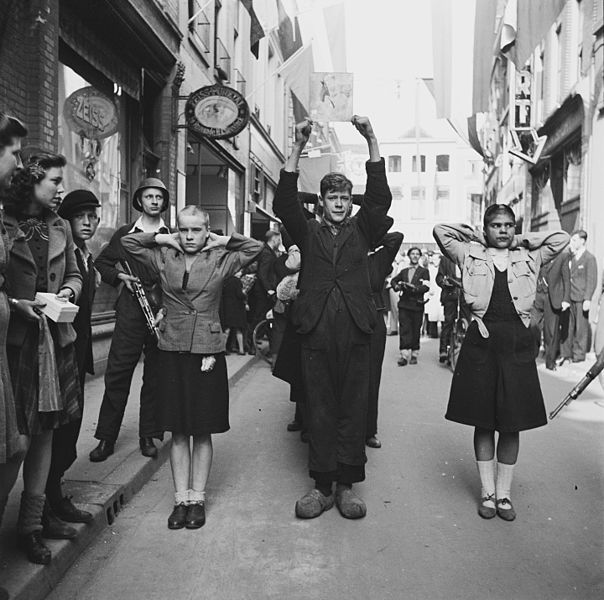
Members of the NSB and shorn Kraut girls being picked up by members of the BS. Source: Wikipedia/Nationaal Archief
This quote describes extensively how the prosecution proceeded of women having relationships with German soldiers. Members of the NSB also endured hard times during the liberation. In The Hague for instance, the NSB building on the Spui was ransacked and put to the torch as early as May 5.
'In oranje op straat als bijna iedereen. Op Spui een brandstapel van inhoud N.S.B.-huis daar.' ('In orange on the street, just like almost everyone else. On the Spui the pyre of the NSB house').[6], as Ms Van Erp Taalman-Kip wrote, the public servant from The Hague. She observed, as eight others did too, how fire was set to the inventory. The same occurred at homes and shops of other members of the NSB. Hendrik Willem van der Voort, a 40-year old family man in The Hague, described the treatment of traitors to the country as follows:
'Hollandse meiden, welke zich met moffen afgegeven hebben, worden gehoond en kaal geknipt. Vanmorgen zoon meid zien behandelen. (…) De N.S.B.'ers worden nu gevangen genomen en in de school tegenover het politiebureau opgesloten. Alles gaat zeer ordelijk toe. Goddank de vergelding, want zij hebben veel kwaad gedaan.' (Dutch girls having had relations with Germans are being bullied and have their hair cut off. This morning I watched such a treatment. (…) The members of the NSB are now being arrested and locked up in the school across from the police station. Everything proceeds in orderly fashion. Thank God for retaliation, they have done much evil').[7]
May 8 was an important day for the diary writers. On this day, the Allies entered the four cities. After a few days of waiting, the liberators had finally arrived. Henny van Irsen-Merhottein, the owner of a ballet school in The Hague wrote on May 8:
'nog steeds honderden menschen langs de weg om de Engelschen te zien komen. Druppelsgewijs komen ze binnen. Vanavond kwamen ook wagens vol met voedsel uit Brabant. Alles wordt toegejuicht.' (Still hundreds of people alongside the road to see the British arrive. They enter one by one. In the evening, trucks loaded with food arrived from Brabant as well. Everyone is being cheered'.)[8] G.A. Mingelen, a teenager from The Hague, also reported the arrival of the Allies:
'Om 8 uur op en kleed me aan en ga bij Kees in de rij staan voor koeken (scheepsbiscuit) ik zie twee Engelse soldaten op de motor. We eten 2 pannenkoeken per persoon. We hebben wat tarwe gehaald. De eerste paar wagens gezien met Engelschen!' (Up at 08:00, I get dressed and line up at Kees for cookies - ship's rusks. I see two English soldiers on a motorbike. We eat two pan cakes each. We obtained some wheat. We have seen the first few trucks with British.')[9]
The enthusiasm during the arrival of Canadians is also well described in the diary of S.H. Sprang-Nortier, a housewife living on the Rapenburg in Leiden:
's Middags: donderend gejuich! We rennen naar het Kort Rapenburg: en ja, de Canadezen! Ruwe, rauwe, bruine kerels, hangend op tanks en vrachtauto's met allemaal kinderen op hun schoot. Ze gooiden steeds maar sigaretten. Je rook echte, blauwdampige benzine lucht, heerlijk! En maar juichen! Dat is dan het moment, dat door alle oorlogsjaren heen, eens zou komen, ondanks alles.' (Ear-splitting cheering in the afternoon! We run to the Kort Rapenburg and yes, the Canadians! Rough, raw, brown guys hanging on tanks and trucks with children on their laps. They kept throwing cigarettes. The smell of blueish vapor of gasoline, Lovely. And cheering, cheering. This is the moment that, through all the years of war, should come despite everything else.')[10]
Everyone wanted something from the soldiers like cigarettes, chocolate or a ride on the army vehicles. Such as M. de Kat, an 18-year-old pupil from The Hague:
'De hand die dit schryft heeft vanavond twee Tommy-handen gedrukt. 3 vrachtauto’s van de RAF en een motorryder moesten stoppen voor de menschenmenigte. Daarna een auto vol met moffen, die per vergissing ook toegejuicht werden. Toen de vergissing bemerkt werd de grootste pret.' (The hand writing this has shaken two hands of Tommies this evening. Three RAF trucks and a motor cyclist had to stop because of the crowd. Then a truck full of Krauts who were cheered at as well by mistake. When the error was noticed, the greatest fun.')[11] Shaking an Allied hand was something to be very proud of. Besides, the passing of a German car was considered laughable by the people with this sentiment. The enthusiasm surrounding the Allies continued until after the liberation. On May 18. P.H. F., an 18-year-old nurse from Haarlem invited Canadian and British soldiers to her house after which she fell in love with one of them.
'En geboft met het mooie weer. Leni en ik zijn voor 't eerst sinds al die jaren in Zandvoort aan het strand geweest! Alles is vernield. De huizen zijn afgebroken. Aan de kapot gereden boulevard maakten we kennis met twee Canadezen en een Engelsman. Wij hadden ze thuis uitgenodigd.' (And lucky we were with the fine weather. Leni and I have been to the beach in Zandvoort for the first time after all those years. Everything is destroyed. The houses have been torn down. On the battererd boulevard we met two Canadians and an Englishman. We invited them into our home.')[12]
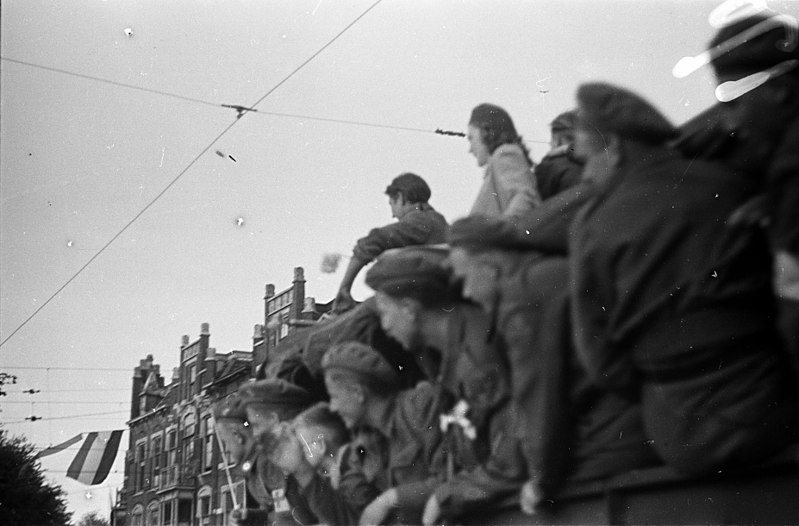
Allied soldiers watching an ecstatic crowd welcoming them during their entry in The Hague in their vehicles. Source: Wikipedia/Nationaal Archief
This last quote shows that daily life soon returned after the liberation. Certainly 10 diary writers made bike trips again for instance or walks in the days after May 8 without fear of being checked or their bikes confiscated. Soon getting food and heat sources also became a priority again. From May 9 on, all 51 diary writers, keeping their diary at that moment and recording their daily life, returned to their daily pattern from before the war. They wrote considerably less than before and started skipping days. The festivities continued but it gradually grew quieter. On May 9 for instance, A.v.d. Veen, a 31-year-old architect from The Hague noted:
'We blijven 's morgens thuis, het eten moest klaar gemaakt worden, maar 's middags gaan we weer de stad in. De storm is nu iets bedaard, doch het is nog erg druk in de stad.' (We stay at home in the morning, dinner has to be prepared but in the afternoon we go into town again. The storm has died down a little but it is still busy in town.')[13]
It didn't only become quieter in town, he also skipped festivities to do household chores. R. Hardorff-Landkamp, a 40-year-old housewife from The Hague, had to busy herself obtaining food again:
'Vanmorgen op brood en groente uit geweest. Groente was wederom niet te krijgen, brood ook niet, doch ik maak me nu niet zenuwachtig want alles komt binnenkort terecht. Ik heb een mooie bos tulpen gekocht, die was nog wel te krijgen al zijn de bloemen deze feestweek schikbarend duur. Ook heb ik gedroogd vlees dat uit de vliegtuigen is geworpen, gekocht; ik zal er haché van maken. Onderweg zag ik weer N.S.B.’ers oppikken.'(Went out this morning for bread and vegetables. They were sold out again, just like bread but it didn't make me nervous as everything will be right soon. I bought a fine bouquet of tulips which are still on sale although these flowers are horrendously expensive in this week of festivities. I also bought dried meat dropped from the airplanes; I'll make haché with it. Along the way, I saw members of the NSB again being arrested.')[14]
The following days proceeded likewise for this woman.
Definitielijst
- Grüne Polizei
- Green Police, nickname – due to their green uniforms – for the Ordnungspolizei (Order Policy) and which is the common denominator for local policy units tasked with exercising regular policy responsibilities during Nazi-Germany from 1936 to 1945.
- heat
- High-explosive anti-tank warhead. Shaped charge projectile to punch through armour. Used in e.g. bazooka or in the Panzerfaust.
- NSB
- National Socialist Movement. Dutch political party sympathising with the Nazis.
- RAF
- Royal Air Force. British air force
- resistance
- Resistance against the enemy. Often also with armed resources.
Disillusion and criticism.
The second feeling during the liberation consisted of fear, insecurity and criticism. Twenty diary writers didn't experience the period of liberation as something festive because sometimes German soldiers were still freely walking the streets after the arrival of the Allies. In the previous chapter, a short mention is made of German soldiers mingling with the celebrating masses. This made the 20 diary writers consider the period between May 4 and 8 not festive but a disappointing and fearful period. Where the liberation of the west of the Netherlands should have been celebrated, the Germans were still in power. The 30-year-old housewife from The Hague, Kroes-Ligtenberg, was one of those 20. On May 5 she wrote:
"Een dag van diepe teleurstelling! Het begon vanmorgen zo goed. Al voor half acht begonnen de vliegtuigen met voedselpakketten over te komen en wij stonden om half 8 op. Ik was nog slap, maar voelde me beter. Direct na 8 uur, het tijdstip van de capitulatie, gingen de vlaggen uit, het was een heerlijk gezicht! (…) Maar ook vanmiddag verscheen er niets en de Duitsers staken het hoofd weer op. In de stad waar duizenden mensen al urenlang stonden te wachten, werden strooibiljetten verspreid, dat er niets waar was van een capitulatie. Hier in de vesting gingen ze de vlaggen in beslag nemen en aanmerking maken op het oranje. Vader was gewaarschuwd maar kon de vlag niet gemakkelijk loskrijgen. Toen hij voor de tweede maal gewaarschuwd was en de vlag net los had, kwamen de Duitse militairen, ‘t geweer werd op hem aangelegd en hij moest de vlag beneden brengen. ’Es it nu keine Waffen-ruhe damit Sie was zu fressen kriegen’, werd gezegd. De stemming zakte aanmerkelijk, de lucht was betrokken en het ging regenen. (A day of deep disappointment! It started so well this morning. Before 07:30, the aircraft with food supplies came flying past and we rose at 07:30. I was still weak but felt better. Right after 08:00, the moment of capitulation, flags were hoisted, it was a wonderful sight! (…) But in the afternoon, nothing happened and the Germans popped up again. In town, where thousands of people stood waiting, flyers were distributed saying there was nothing true about a capitulation. Here in the fortress, they started confiscating flags and complaining about the orange. Father was warned but couldn't untie the flag. When he was warned a second time and had just untied the flag, German military appeared. Guns were pointed at him and he was ordered to bring the flag down. "Es it nu keine Waffen-ruhe damit Sie was zu fressen kriegen", (there is a cease-fire now so you can have something to eat"), they said. The mood sank considerably and it started to rain.')[15]
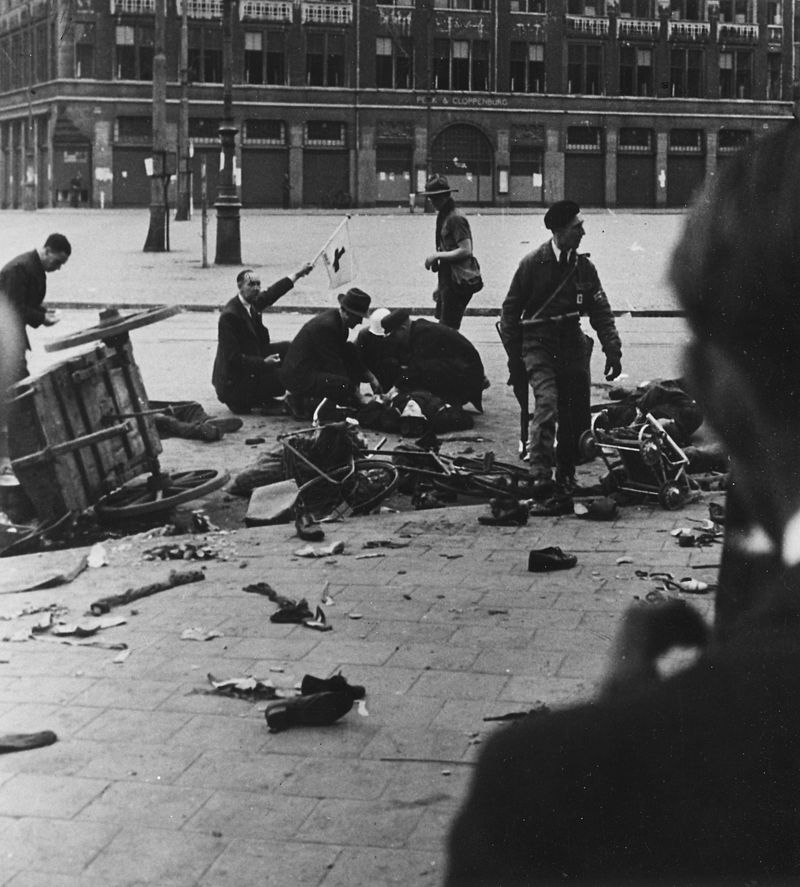
On May 7, 1945, a shooting erupted between Germans in the Groote Club on the Dam in Amsterdam and hard-headed members of the BS, causing numerous dead and injured. Source: Wikipedia/Nationaal Archief
Other diary writers as well showed this disappointment. the presence of German soldiers. Procurator D. van Elsas for instance - 50 years of age - made a short entry on May 6:
'Er zijn nog moffen in West Holland, nog moffen in Den Haag.' (There still are Krauts in western Holland, still Krauts in The Hague.')[16]
In his diary he continues with a long list of materials and habits the Germans have taken away from the population for five years.
'Aan het ontbijt komen de geruchten, dat we ons heel kalm moeten houden, want alles is nog lang niet voor elkaar, de kustcommandant wil zich niet overgeven, wat een spanning!,' A. R. van Liempt wrote, a 40-year-old nun from Wassenaar:Maar de vrede laten we ons toch niet uit het hoofd praten!' (At breakfast, the rumors come up to the effect we must remain very calm as not everything is OK yet, the coast commander does not want to surrender, what a tension! 'We won't change our minds about peace!')[17] Personally, she felt less discouraged than other diary writers by keeping faith in the liberation. Another example of insecurity comes from the diary of the 40-year-old teacher A.F. Koenraads. He finishes his diary on May 7 by writing
'Ik had gemeend dit dagboek te kunnen eindigen met een zin als: daar verschijnen de eerste Canadezen, nog besmeerd met kruitdamp, om de hoek van de straat. Het is heel anders gelopen. We wachten hun komst, vies en somber, nog steeds af. Ik had gedacht dat het einde een verlichting zou betekenen, zoiets als het afleggen van een loden pak. Weer is het anders gelopen.' ('I had hoped to finish this diary with a sentence like: there are the first Canadians, still smelling of gun powder on the corner of the street. Things have proceeded quite differently again. We, dirty and sad, are still waiting for their arrival. I thought the end would be enlightenment, something like taking off a lead suit. Things have gone differently again.')[18]
This fear and dissatisfaction was mainly caused by the presence of German troops in the west, sometimes until after the capitulation. Allied soldiers staying away also caused dissatisfaction among them. G.A. Mingelen, a 19-year-old boy from The Hague who gladly would have wanted to join the resistance, wrote about this:
'Wanneer komen de geallieerde troepen? (…) Geruchten dat het niet waar is! Om 10 uur ga ik met vader naar Sjean, we zien Duitse auto’s voorbij rijden. We zien ook iets heel eigenaardigs, een sportvliegtuigje zweeft in de lucht en verdwijnt.' (When will the Allied troops come? (…) Rumors that it isn't true. At 10:00 I go to Sjean with father, we see German cars driving by. We also see something weird, a light plane glides through the sky and disappears.) A little further on he continues: 'Zolang ik geen Engelschen hier zie, voel ik mij niet zeker; ben in geen feeststemming.' (As long as I see no British here, I don't feel safe; I am not in a festive mood')[19] For this boy there was no festive mood as long as German troops were still present. 'Holland (de D.) had gecapituleerd!!' Hannie Mink wrote, a pupil from The Hague who was often unable to walk because of her swollen legs.
'Vanmorgen om 8 uur ingegaan. Maar waarom zijn de Engelsen of Canadezen hier dan nog niet? Waarom rijden en lopen de moffen hier met grimmige gezichten en de hand aan de trekker van hun geweer rond, willen ze zich hier niet overgeven, zullen ze dan toch nog door blijven vechten? Een angstig vermoeden … ('Effective as from 08:00. But why aren't the English or Canadians not here yet? Why do the Krauts ride and walk around with grim faces, their weapons cocked, don't they want to surrender here, will they keep fighting? A fearful assumption ….)[20]
People within this sentiment were insecure on the days that freedom had returned and did write about it in their diaries. Slogans like: 'I thought everything was over, Where in God's name are the English' and 'there are still Krauts in west Holland' appear in 21 diaries. Even on May 12, four days after the arrival of the Canadians, housewife Kroes-Ligtenberg still noted:
'het blijft hier hetzelfde: nog altijd Duitsers en de vesting nog gesloten. Dus voor mij nog geen uitzicht op hulp in het huishouden.' (it remains the same here: Germans still around and the fortress closed.(So for me no prospect of domestic help yet.)[21]
After the capitulation, the mood of fear of some individuals turned to one of criticism towards the government and the Dutch population itself. C.P.J. Paardekoper, 40 years of age and director of a welding company in Zoeterwoude wrote about this on May 10:
'Men zou zoo zeggen nu moest alles rustig zijn. Helaas, neen daar wordt nog veel gekankerd … maar men moet het volk wat vergeven … het heeft honger … het ontbreekt aan alles … het heeft niets en dan ook niets meer … alles is ons ontnomen … en nu is het volk redeloos en allen die zich nog plaatsen in deze chaos om te regeren, om iets te doen, vangen de felle vlagen van de kritiek op van het volk.' (One would say everything should be quiet now. Sadly no, there still is much complaining …… but one should excuse the population …… they are hungry …. there is a shortage of everything …. they don't own anything at all ….. everything has been stolen from us ……..and now they are unreasonable and all who place themselves in this chaos to rule actually absorb the heavy criticism of the population.')[22] The single mother from Wassenaar s'Jacob-des Bouvrie noticed a dip in the mood during the liberation:
' En terwijl we maar zaten te wachten, zakte de stemming. Want de Engelschen bleven maar uit. Een buurjongen kwam vreselijk zenuwachtig aan. Berichten kwamen er niet. Het begon te regenen en de oranjeklanten verdwenen van de straat.' (And while we sat there waiting, the mood dropped. The British didn't arrive. A neighbor arrived, extremely nervous. Messages didn't come. It started to rain and the orange-minded disappeared from the streets.')[23]
Another phenomenon within this sentiment was that people were much more critical about events during the liberation. First of all, there was criticism about the treatment of woman having relationships with Germans and members of the NSB. Out of the 20 diary writers showing this sentiment, seven of them were dissatisfied with the harsh treatment of traitors to the country. For instance Henriëtte Stoelman, a 20-year-old pupil at the Christion U.L.O. in Delft.
'Alle moffenmeiden in de stad tentoongesteld, met kaalgeschoren kop en met oranje menie of teer met zaagsel over hun kop. Soms met nog een klein plukje haar van voren met een oranje strikje. Ze werden opgejaagd door de stad en op bordes van stadhuis moesten ze met vlag zwaaien. Ook zou men ze met blote voeten in de regen hebben laten lopen. De brandweer had het gedaan. Ze maakten het veel te erg!' (All Kraut girls displayed in town their heads bald and with orange paint or tar with sawdust on their heads. Sometime with a little tuft of hair on the forehead with an orange bow. They were chased through town and on the steps of the town hall they were compelled to wave flags. They also would have been compelled to walk in the rain on bare feet. The fire brigade did this. They made it far too bad.')[24] Despite Henriëtte agreeing with the punishment of the girls, she considered it too harsh. Nurse P.H. F. from Haarlem wasn't happy with the punishment of these girls either. One of her friends actually had a relation with a German soldier.
'Toen kwam het beestachtige naar boven: Het verzamelen van de 'moffenmeiden' en het kaalscheren… ik moest steeds aan Betty denken. Stel je voor… Nee, niet aan denken! Zo zijn er misschien meer meisjes geweest. Die een goede jongen hadden getroffen… het waren doch niet allemaal 'soldatensletten'. (Then the bestiality emerged: rounding up of the Kraut girls, the shaving …… I had to think of Betty all the time, Imagine…..No, don't think of it. There may have been more girls who had found a nice boy. There weren't all hookers.')[25]
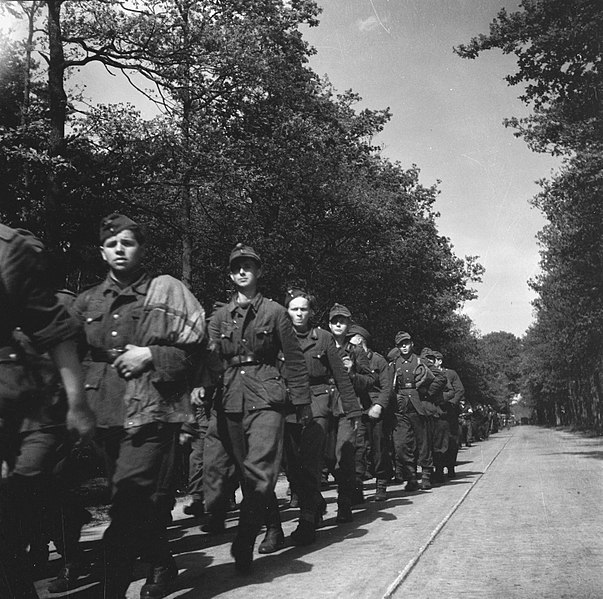
German military on their way to the depot in Soest to turn in their weapons. May 10, 1945. Source: Wikipedia/Nationaal Archief
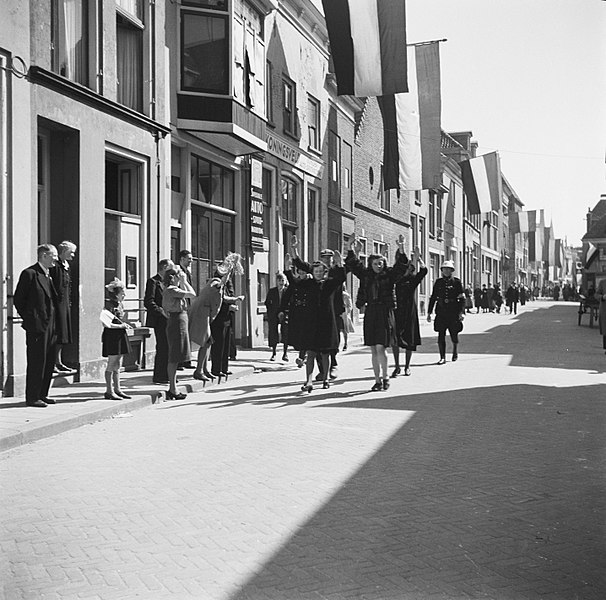
Not everybody looks happy when Kraut girls are being arrested and taken away. Source: Wikipedia/Nationaal Archief
A second form of criticism during liberation was targeted at the BS and the scouts. Han de Wilde for instance, the bed seller from Leiden, noticed that many 'wrong' persons entered service in the BS:
'helaas zit er veel kaf onder het koren, als zwarte handelaren enz. die den naam van de BS ernstig schaden.' (unfortunately, there are many rotten apples in the basket such as black marketeers who seriously damage the reputation of the BS.')[26] Miss 'sJacob-des Bouvrie, the single mother from Wassenaar, noticed that the BS didn't entirely consist of good boys:
'Ze hadden mijn broer gevraagd om bij de BS te komen, omdat ze nog jongelui tekort kwamen. Hij weigerde echter op grond van de mentaliteit die er onder die lui heerschte. Alle goede elementen waren er in de week na de capitulatie uitgeloopen. De heeren deden aan baantjes jagen en maakte zicht belangrijk als onder de N.S.B. en er heersche een bureaucratie, die eenvoudig onmogelijk was.' (They had asked my brother to join the BS because they were short of personnel. He refused however because of the mentality that prevailed among the men. All good members had left in the week after the capitulation. The 'gentlemen' were job hunters and made themselves look important like in the NSB and there was a bureaucracy that was simply impossible.)[27] Puber Wijkhuizen voiced something similar as members of a patriotic organization were mistakenly favored above others:
'Was jij niet bij de ondergrondse"? Dat wordt me gevraagd en ik gaf helaas geen juist raak antwoord. Ik ben ook eigenlijk beduveld door Trouw. Die geeft me geen werk. Maar ik vind het toch ook niet leuk, dat jongens, die niets uitvoerden tijdens de bezetting nu opeens met een band flaneren. Bv. ook de padvinders, die overal door en bij mogen, terwijl die in vele gevallen niets presteerden.' (Weren't you in the resistance?" I was asked and unfortunately I gave the wrong answer. Actually I was also tricked by Trouw as they won't employ me. But I don't like it either that boys who did nothing during the occupation, suddenly parade around with a band. The scouts also for instance who are allowed to pass anywhere and attend anything while in many cases they did nothing.')[28]In total, five diary writers were dissatisfied with the situation within the BS.
After May 8. daily life gradually returned and most forms of criticism disappeared, thanks to the arrival of the Allies. As mentioned in the previous chapter, bike trips were made again and food had to be gathered because the shortages of food weren't over yet. There were however seven diary writers who criticized the speed with which the food supply progressed. B.L.P. and his spouse for instance, the couple from The Hague which kept a diary together for their future children:
'De levensmiddelenvoorziening ligt geheel in disorde. Er is geen brood, terwijl ook de Rodekruisvoorziening nog niet is doorgegaan.' (The food supply for instance is in complete disarray. There is no bread while the supply by the Red Cross hasn't started yet.')[29]
A.J.G. Huizinga-Sannes, wife of a clergyman from The Hague, wrote on her birthday:
'Ik ben vandaag jarig maar het wordt een hopeloze verjaardag want er is helemaal geen eten.'(It is my birthday today but it is a hopeless day because there is no food at all.')[30] She noticed a shortage of food one week after the Netherlands had been liberated. This anger was caused by the expectations of a number of diary writers of the post-war period. Writers like Huizinga-Sannes, De Wilde and Van Elsas expected the food distribution, the supply of gas and electricity to resume quickly with the arrival of the Allies. In the run-up to the liberation, they already voiced this expectation.
All told, there were 20 diary writers who showed their anxiety and fear during the days of capitulation. People mainly felt irritated by the presence of German soldiers during the days of liberation. The long wait for the arrival of the Allies also caused much dissatisfaction. More of this during capitulation was caused by the persecution of traitors to the country: seven writers were against it or considered the penalties too harsh and rejected the attitude of the members of the BS.
Definitielijst
- brigade
- Consisted mostly of two or more regiments. Could operate independently or as part of a division. Sometimes they were part of a corps instead of a division. In theory a brigade consisted of 5,000 to 7,000 men.
- capitulation
- Agreement between fighting parties concerning the surrender of a country or an army.
- NSB
- National Socialist Movement. Dutch political party sympathising with the Nazis.
- resistance
- Resistance against the enemy. Often also with armed resources.
Diseases
The third sentiment during the liberation consisted of people who partially or entirely didn't experience the liberation due to illness or weakness. Another fact that is almost forgotten in modern literature is that people, during the liberation of the west, still suffered from diseases or weakness caused by the food shortages. After all, the supply could only be raised to a normal level after the liberation of west Netherlands, despite the earlier food droppings in early April. It took a long time before people could take in enough calories again. Five diary writers were either too weak to celebrate or were in hospital such as public servant Van Erp Taalman-Kip. She missed the festivities and only learned from others how the festivities progressed.
'Gisterenavond 9 uur groot gejoel op straat. Weer zelfde als zondag. Al in bed. Hospitaal. Iemand Vertelde overal vlaggen, mensen, grote menigten, wonder v.d. Vennestr. Leek nu heusch wel waar vanmorgen. Nog overal vlaggen, al vroeg vliegtuigen.' ('Last night 21:00 much cheering in the streets. Same as on Sunday. Already in bed. Hospital. Somebody told me flags everywhere, people, large crowds, wonder vd Vennestraat. Seemed to be true this morning. Still flags everywhere aircraft very early.')[31]
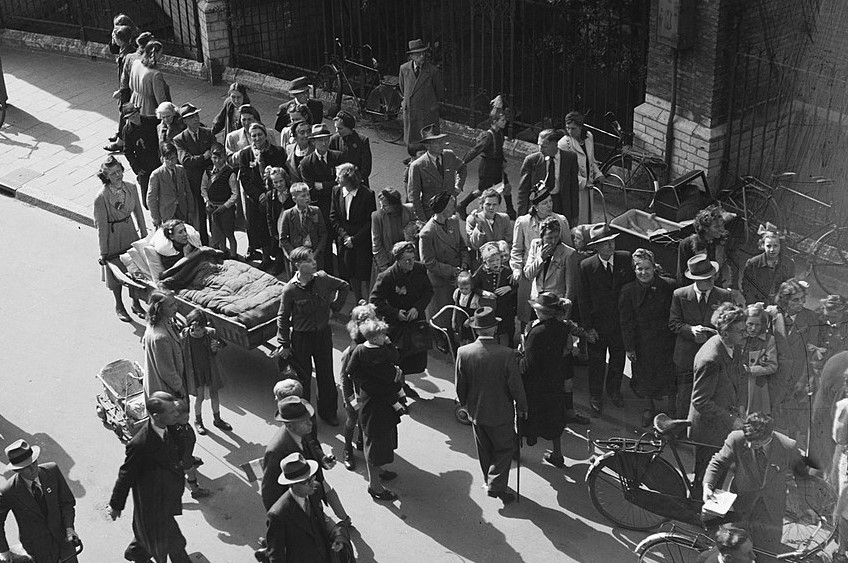
A sick woman watching the parade of the liberators from a hand cart. Source: Wikipedia/Nationaal Archief
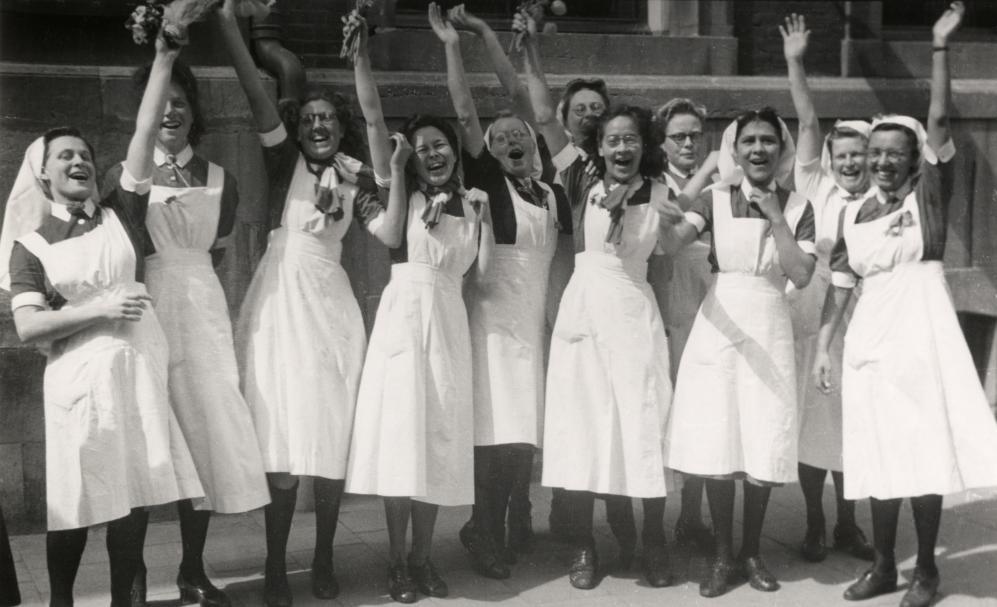
Nurses waynig enthusiastically during the entry of the Canadians in The Hague. Source: Wikipedia/Collectie SPAARNESTAD
Nurse P.H. F. from Haarlem missed part of the celebrations because she had to care for someone at that moment.
'Daar staan we dan: vijf jaren later … na die ochtend, dat we 's morgens om half vier werden opgeschikt, nadat de Duitsers ons land waren binnengevallen. De radioberichten: "Parachutisten landen overal; toen de wilde teleurstelling van de capitulatie en alle ellende die volgde" … en nu zit ik hier vast, bij een man, die Rotterdam hielp verdedigen als marinier!' ('There we are then: five years later ….. after that morning when we were shaken at 03:30 after German troops had invaded our country. The news on the radio: "Paratroops landing everywhere; then the great disillusion of the capitulation and all ensuing misery" ….. And I am stuck here with a man who helped defend Rotterdam as a Marine.')[32].
Hospital workers could experience little of the festivities. Moreover, diary writers noted that people were celebrating while they were actually too weak physically. Housemother Fie van Baaren from Delft wrote:
'er was zoo’n feeststemming, dat men zijn eigen leed en honger erdoor vergat; het was zo typisch, dat de Canadeezen wel gedacht zullen hebben ‘is dat nu een hongerland met al die feestvierende menschen’, maar de reactie kwam al spoedig. Wij hadden er geen fut meer voor. Tientallen vielen er flauw en overdag waren wij niets waard, omdat wij laat naar bed gingen'. ('there was such a festive mood, making people forget their own hunger and weakness; it was so typical, the Canadians will have thought "is that a country in famine with all those people celebrating?" but the reaction came soon. We were out of steam. Dozens fainted and during the day we were exhausted because we went to bed late.')[33]
The image presented by Van Baaren is also noted in the book Oranje Bitter - Nederland bevrijd. When a film fragment of the celebration during the arrival of the Allies in Amsterdam was studied, historian M. Bossenbroek noted that a large number of people was participating in the festivities with starving faces. For instance, there was a woman in the crowd with two teeth missing and an emaciated face. She fainted shortly after this fragment was recorded. Furthermore in the background, there were people dressed in ragged clothing and with emaciated faces as a result of shortage of money and malnutrition.[34]
Definitielijst
- capitulation
- Agreement between fighting parties concerning the surrender of a country or an army.
Mixed feelings
Not all diary writers fitted into the pattern of the three sentiments mentioned earlier. Six authors appeared to show mixed feelings in their diaries. They celebrated on the street between May 4 and 8 while for instance they opposed the treatment of traitors to the country. An example of this is Johan van der Maas, a devoted religious 30-year-old male from The Hague. On May 4 he was delirious after learning that on May 5 we would be liberated:
'We zijn eindelijk na, op enkele dagen na, een bezetting van vijf jaren vrij. Jaren van harde onderdrukking, van slavernij, van tyrannie. We zijn vrij! Godlof we zijn vrij, bevrijd van Duitsche overheersching. Hoezee, drieverf hoezee!!! Een nieuwe tijd breekt aan. Een heerlijke tijd breekt aan!' ('Except for a few days, we are finally free after an occupation of five years. Years of harsh suppression, slavery, tyranny. We are free! Thank God, we are free, freed of German domination. Hooray, three times hooray!!! A new era begins. A wonderful time begins')[35] The following days he noticed that German soldiers, handed over authority to the former mayor as late as May 7 against all expectations. He also was against the treatment of Kraut girls:
'Ik hoor verhalen over geheel kaalknippen van de vrouwen enz. Heb het zelf niet gezien, kan dus voor de waarheid niet instaan. Toch keur ik dit af. Ze moeten gerechtelijk gestraft worden. ('I heard stories about women being cut bald etc. I haven't observed this myself so I can't vouch for this. Yet, I reject this. They should be penalized by the court.')[36] He preferred judiciary proceedings over public humiliation. So there was a group of diary writers who didn't relate to just one but to various sentiments.
Conclusion
Some conclusions can be drawn from the research of the diaries during the period of liberation and the days after. First of all it appears that the standard image of the liberation as described in the media corresponds with one of the sentiments. A total of 32 diary writers celebrated without worries between May 4 and 8. They saw people dressed in orange everywhere, music was played and memorial services were held in churches. Members of the NSB, Kraut girls and other traitors were treated harshly by people from this sentiment during the festivities. Full of expectations, they waited for the arrival of the Allies. The standard pattern of the liberation is confirmed by this sentiment. What didn't emerge was that people celebrated for days on end. Despite tattoos and meetings shortly after the liberation, on May 9 people resumed their daily life. Worries about food, household chores, family visits and bike rides became important again.
A second conclusion that can be drawn is that 20 diary writers showed signs of criticism, fear and displeasure. In secondary literature, this image hasn't shown up in detail before. Only Bart van der Boom described this disillusion in short in his book Den Haag en de Tweede Wereldoorlog. One third of the authors took a very pessimistic and critical attitude during liberation. People remained afraid because of the continuing presence of German soldiers in western Netherlands. These writers only felt liberated after the Allies had entered the cities on May 8. The long wait for the arrival of the Allies caused much dissatisfaction as well. In addition, there was criticism towards the BS and towards the population itself within this sentiment. Actually, seven writers didn't agree with the treatment of traitors. They were treated inhumanely and should have been penalized within a judiciary system instead. The BS was criticized by five writers for their attitude as profiteers. Within this sentiment, almost all forms of criticism disappeared after May 8. Now that the Allies had finally arrived, festivities could start for these writers as well. Some individual still saw armed German soldiers walking the streets but that was it. In contrast, five writers voiced criticism about the food distribution that in their opinion started too slowly. On arrival of the Allies they had expected the food distribution would have been brought to normal level in the first few weeks after the liberation.
Finally, there appeared to be a small group of writers who were too weak to participate in the festivities during liberation. They were too ill or too weak to get out of bed or were in hospital. Nurses caring for their patients were likewise unable to watch all festivities. Eight writers had stopped writing after May 5 making it unclear how they related to these sentiments. They opted to stop writing because of lack of space or interest. In addition, there were six writers who fully enjoyed their acquired freedom on the one hand and on the other hand criticized for instance the persecution of traitors and the presence of German soldiers. They showed characteristics of various sentiments.
See also:
Run-up to the liberation of the Netherlands
Last month of the war
Notes
- Beelen, 762 (4 mei 1945).
- Simons, 846 (4 mei 1945).
- Jan Bok jr., Dagboek, 146 (5 mei 1945).
- Van Berge Henegouwen en Van Doorn-Beersma, 522 (6 mei 1945).
- Fr. A. M. van den Elsen, Dagboek, 67 (8 mei 1945).
- Van Erp Taalman - Kip, 127 (5 mei 1945).
- Hendrik Willem van der Voort, Dagboek, 199 (8 mei 1945).
- Henny van Irsen-Merhottein, Dagboek, 60 (8 mei 1945).
- G. A. Mingelen, Dagboek (8 mei 1945).
- Sprang-Nortier, 8 (8 mei 1945).
- M. de Kat, Dagboek, 7 (8 mei 1945).
- P. H. F., Dagboek van een verpleegster, 48 (8 mei 1945).
- A. vd Veen, Dagboek, 44 (9 mei 1945).
- R. Hardorff-Landkamp, Dagboek, 83 (8 mei 1945).
- Kroes-Ligtenberg, 102 (5 mei 1945).
- Van Elsas, 939 (6 mei 1945).
- A. R. van Liempt, Dagnotities, 11 (6 mei 1945).
- Koenraads, 614 (7 mei 1945).
- G. A. Mingelen, Dagboek (5 mei 1945).
- (H. S.) Hannie Mink, Dagboek van een anonieme scholiere, 171 (5 mei 1945).
- Kroes-Ligtenberg, 112 (12 mei 1945).
- W. van Kesteren, Oorlogsdagboek C.P.J. Paardekooper, 229 (10 mei 1945).
- Christina Maria s'Jacob-des Bouvrie, Dagboek, 19 (7 mei 1945).
- Henriëtte Stoelman, Dagboek (5 mei 1945).
- F., 60 (5 mei 1945).
- Henegouwen en Doorn-Beersma, 525 (20 mei 1945).
- s'Jacob-des Bouvrie, 26 (12 mei 1945).
- Wijkhuizen, 37 (10 mei 1945).
- B. L. P., Dagboek (8 mei 1945).
- A. J. G. Huizinga-Sannes, Dagboek gericht aan dochter - Deel 4, 79 (15 mei 1945).
- Van Erp Taalman-Kip, 127 (5 mei 1945).
- F., 46 (10 mei 1945).
- Van Baaren, 38 (10 mei 1945).
- M. Bossenbroek, G. Nijssen en E. Willems, Oranje Bitter - Nederland Bevrijd! (Zwolle 2010) 8.
- Johan van der Maas, Oorlogsdagboek van Johan van der Maas (4 mei 1945).
- Ibidem (7 mei 1945).
Definitielijst
- NSB
- National Socialist Movement. Dutch political party sympathising with the Nazis.
Information
- Article by:
- Joshua Rijsdam
- Translated by:
- Arnold Palthe
- Published on:
- 05-02-2023
- Feedback?
- Send it!
